What is “Unfortunately, There Are Some Bad News For You” Email Scam
Unfortunately, There Are Some Bad News For You Email Scam refers to a sextortion scam email that threatens to release a private video of users if they do not agree to pay $1750. It’s a fairly typical sextortion scam that follows the same pattern as other scams of this kind. 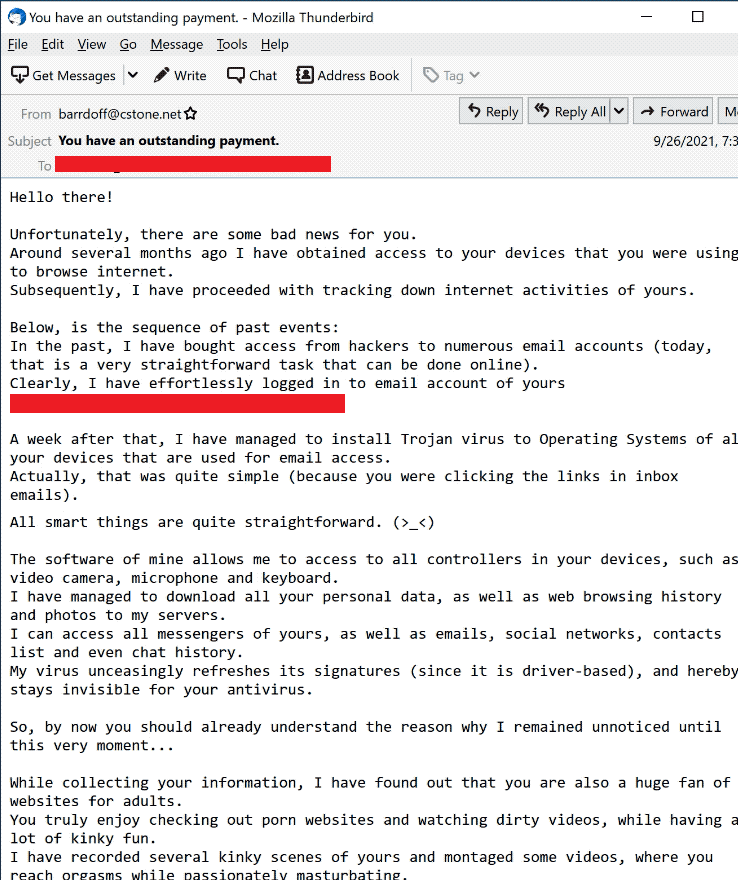
Offers
Download Removal Toolto scan for Email ScamUse our recommended removal tool to scan for Email Scam. Trial version of provides detection of computer threats like Email Scam and assists in its removal for FREE. You can delete detected registry entries, files and processes yourself or purchase a full version.
More information about SpyWarrior and Uninstall Instructions. Please review SpyWarrior EULA and Privacy Policy. SpyWarrior scanner is free. If it detects a malware, purchase its full version to remove it.

WiperSoft Review Details WiperSoft (www.wipersoft.com) is a security tool that provides real-time security from potential threats. Nowadays, many users tend to download free software from the Intern ...
Download|more


Is MacKeeper a virus? MacKeeper is not a virus, nor is it a scam. While there are various opinions about the program on the Internet, a lot of the people who so notoriously hate the program have neve ...
Download|more


While the creators of MalwareBytes anti-malware have not been in this business for long time, they make up for it with their enthusiastic approach. Statistic from such websites like CNET shows that th ...
Download|more
“Unfortunately, There Are Some Bad News For You” is how this sextortion scam begins. “You have an outstanding payment” is the email’s subject line. These kinds of lines are bound to catch users’ attention, even if the emails often land in the spam folder. The email then continues to explain that users’ devices have been hacked and that the supposed hacker has been monitoring their internet activities for a while. The hacker claims that they purchased access to users’ email accounts, and were able to hack users’ devices after they clicked on malicious links that downloaded trojans. The malware supposedly gave the hacker access to everything in the computer, including the camera, microphone, and keyboard. They then supposedly downloaded all data from the infected computers, including personal information, browsing history, and photos. They also claim to have access to messages, emails, social media, etc.
Text presented in the “Unfortunately, there are some bad news for you” scam email letter:
Subject: You have an outstanding payment.
Hello there!
Unfortunately, there are some bad news for you.
Around several months ago I have obtained access to your devices that you were using to browse internet.
Subsequently, I have proceeded with tracking down internet activities of yours.Below, is the sequence of past events:
In the past, I have bought access from hackers to numerous email accounts (today, that is a very straightforward task that can be done online).
Clearly, I have effortlessly logged in to email account of yours (**********).A week after that, I have managed to install Trojan virus to Operating Systems of all your devices that are used for email access.
Actually, that was quite simple (because you were clicking the links in inbox emails).
All smart things are quite straightforward. (>_<)The software of mine allows me to access to all controllers in your devices, such as video camera, microphone and keyboard.
I have managed to download all your personal data, as well as web browsing history and photos to my servers.
I can access all messengers of yours, as well as emails, social networks, contacts list and even chat history.
My virus unceasingly refreshes its signatures (since it is driver-based), and hereby stays invisible for your antivirus.So, by now you should already understand the reason why I remained unnoticed until this very moment…
While collecting your information, I have found out that you are also a huge fan of websites for adults.
You truly enjoy checking out porn websites and watching dirty videos, while having a lot of kinky fun.
I have recorded several kinky scenes of yours and montaged some videos, where you reach orgasms while passionately masturbating.If you still doubt my serious intentions, it only takes couple mouse clicks to share your videos with your friends, relatives and even colleagues.
It is also not a problem for me to allow those vids for access of public as well.
I truly believe, you would not want this to occur, understanding how special are the videos you love watching, (you are clearly aware of that) all that stuff can result in a real disaster for you.Let’s resolve it like this:
All you need is $1750 USD transfer to my account (bitcoin equivalent based on exchange rate during your transfer), and after the transaction is successful, I will proceed to delete all that kinky stuff without delay.
Afterwards, we can pretend that we have never met before. In addition, I assure you that all the harmful software will be deleted from all your devices. Be sure, I keep my promises.That is quite a fair deal with a low price, bearing in mind that I have spent a lot of effort to go through your profile and traffic for a long period.
If you are unaware how to buy and send bitcoins – it can be easily fixed by searching all related information online.Below is bitcoin wallet of mine: 17Ga9z9f3HFBafsmMq76NVsVX5r1CzxhaP, 1B5ic9iQpyafTEfWxHM4Xq6PkzbickrL8g, 13Hayv2eeuwHTcUNhZVeCJytdBQosoSwVq, 1FhTVkgUpVyWNRG8bJkgyJipEmoEtitZwd, 15KquhG7RGkyXvEVT1aXLgPt4qgBEVe8rN, 19PRxthVN1P9hsXcStqc2Kp8Yy4hXyXVau
You are given not more than 48 hours after you have opened this email (2 days to be precise).
Below is the list of actions that you should not attempt doing:
> Do not attempt to reply my email (the email in your inbox was created by me together with return address).
> Do not attempt to call police or any other security services. Moreover, don’t even think to share this with friends of yours. Once I find that out (make no doubt about it, I can do that effortlessly, bearing in mind that I have full control over all your systems) – the video of yours will become available to public immediately.
> Do not attempt to search for me – there is completely no point in that. All cryptocurrency transactions remain anonymous at all times.
> Do not attempt reinstalling the OS on devices of yours or get rid of them. It is meaningless too, because all your videos are already available at remote servers.Below is the list of things you don’t need to be concerned about:
> That I will not receive the money you transferred.
– Don’t you worry, I can still track it, after the transaction is successfully completed, because I still monitor all your activities (trojan virus of mine includes a remote-control option, just like TeamViewer).
> That I still will make your videos available to public after your money transfer is complete.
– Believe me, it is meaningless for me to keep on making your life complicated. If I indeed wanted to make it happen, it would happen long time ago!Everything will be carried out based on fairness!
Before I forget…moving forward try not to get involved in this kind of situations anymore!
An advice from me – regularly change all the passwords to your accounts.
After using these tactics to frighten users, the scammer then claims to have made videos of users watching pornographic content. It’s supposedly a split video, with one side showing the adult video and the other displaying users watching it. The scammer threatens to release the video online and send it to all contacts if users do not agree to send $1750 in Bitcoins to one of the provided wallet addresses. They promise to delete the video as soon as the money is transferred.
Further down the email, the scammer threatens users not to contact law enforcement or security services, or tell anyone. They claim they will supposedly know if this happens because they “have full control over all your systems”. The scammer also claims that reinstalling the OS will not change anything. That is actually correct, but not because the process would not remove the trojan but rather because there is nothing to remove in the first place. If it hasn’t been made clear yet, this email is just another sextortion scam and should not be taken seriously. Nothing the email says is true. There is no trojan on users’ computers (unless it’s unrelated to this scam), nor has a video of them watching adult content been made.
Unfortunately, this particular scam appears to be somewhat successful as the provided wallet addresses indeed have multiple transfers made to them. All accounts have Bitcoins sent to them, and a couple of them have sums like $15,000 and $21,000 transferred to them overall.
This sextortion email is not particularly believable, though it does look more legitimate than many other attempts. Some more ridiculous extortion attempts include emails that claim an assassination hit has been ordered on the user and will be carried out if money is not paid. Another similar campaign threatens to detonate a bomb at the user’s place of work. More recently, scammers started extortion campaigns that threaten to infect users and their whole families with the coronavirus. It goes without saying that these emails are nothing more than scams.
Why did this sextortion email land in your inbox?
Sextortion emails always claim that users receive these emails because their email accounts and computers have been hacked. However, that is very far from the truth. In reality, users receive sextortion emails because services they use leak their email addresses. Email addresses that are leaked get sold on various hacker forums as part of large databases of personal information. Scammers and cybercriminals then use those email addresses to launch their spam campaigns, whether they’re sextortion emails or carry malicious software. You can check whether, or how many times, your email address has been leaked on haveibeenpwned. If the site shows that your email address has indeed been leaked, the “Unfortunately, There Are Some Bad News For You” Email Scam will not be the last sextortion scam to land in your inbox. Or any scam for that matter. While the spam may be annoying, if you learn to recognize scams, scam emails shouldn’t cause any significant problems.
One thing we should mention about sextortion emails is that they sometimes contain users’ actual passwords. The passwords are mentioned at the beginning of these emails in order to frighten users and make the emails appear more legitimate because how else would the sender of the email have the password if not because they hacked users’ computers. The real reason scammers are aware of the passwords is that they too have been leaked by services for which the passwords are used. It’s never because the computer has been hacked.
If you ever receive a sextortion email and it contains your password, change it immediately. Furthermore, never reuse passwords. If hackers get the password, they can use it to access all other accounts for which it’s used.
Unfortunately, There Are Some Bad News For You Email Scam removal
Whenever these kinds of emails land in your inbox, you can just delete them from the inbox without paying any attention to their contents. So if you received this email, simply remove “Unfortunately, There Are Some Bad News For You” Email Scam from your inbox. Keep in mind that none of these emails are ever legitimate.
In some cases, the emails come with links or attached files. For example, an email may claim that the attached file is the supposed video users are threatened with. If you were to open such an attachment, more than likely, your computer would become infected with serious malware, such as ransomware. Links in such emails could lead to phishing websites or sites that have malware. As a general rule, never interact with links or attachments in emails, unless you are absolutely sure the email is safe.
Offers
Download Removal Toolto scan for Email ScamUse our recommended removal tool to scan for Email Scam. Trial version of provides detection of computer threats like Email Scam and assists in its removal for FREE. You can delete detected registry entries, files and processes yourself or purchase a full version.
More information about SpyWarrior and Uninstall Instructions. Please review SpyWarrior EULA and Privacy Policy. SpyWarrior scanner is free. If it detects a malware, purchase its full version to remove it.



WiperSoft Review Details WiperSoft (www.wipersoft.com) is a security tool that provides real-time security from potential threats. Nowadays, many users tend to download free software from the Intern ...
Download|more


Is MacKeeper a virus? MacKeeper is not a virus, nor is it a scam. While there are various opinions about the program on the Internet, a lot of the people who so notoriously hate the program have neve ...
Download|more


While the creators of MalwareBytes anti-malware have not been in this business for long time, they make up for it with their enthusiastic approach. Statistic from such websites like CNET shows that th ...
Download|more
Quick Menu
Step 1. Uninstall Email Scam and related programs.
Remove Email Scam from Windows 8
Right-click in the lower left corner of the screen. Once Quick Access Menu shows up, select Control Panel choose Programs and Features and select to Uninstall a software.
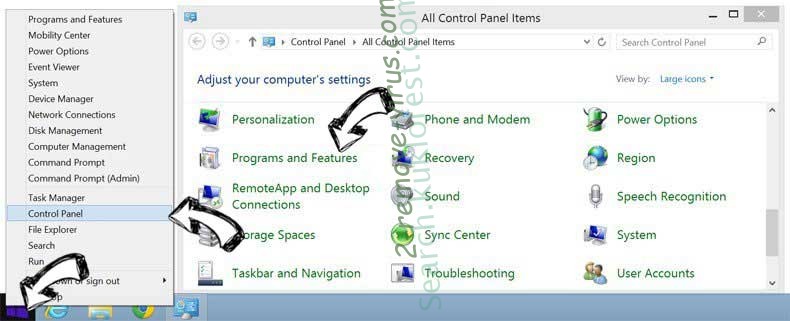

Uninstall Email Scam from Windows 7
Click Start → Control Panel → Programs and Features → Uninstall a program.
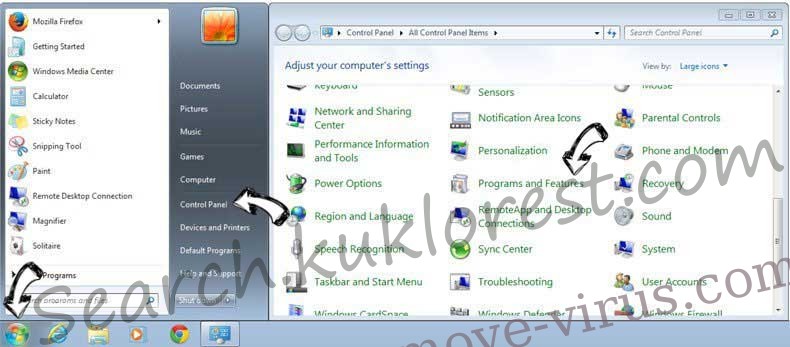

Delete Email Scam from Windows XP
Click Start → Settings → Control Panel. Locate and click → Add or Remove Programs.


Remove Email Scam from Mac OS X
Click Go button at the top left of the screen and select Applications. Select applications folder and look for Email Scam or any other suspicious software. Now right click on every of such entries and select Move to Trash, then right click the Trash icon and select Empty Trash.


Step 2. Delete Email Scam from your browsers
Terminate the unwanted extensions from Internet Explorer
- Tap the Gear icon and go to Manage Add-ons.

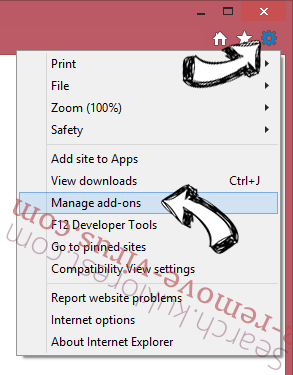
- Pick Toolbars and Extensions and eliminate all suspicious entries (other than Microsoft, Yahoo, Google, Oracle or Adobe)

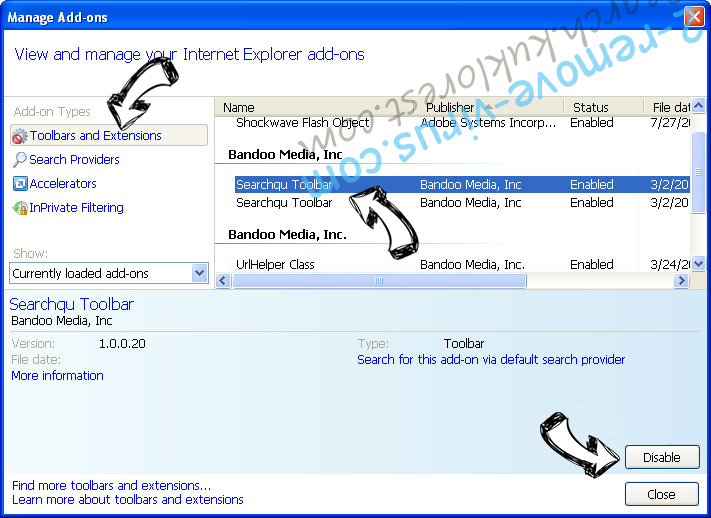
- Leave the window.
Change Internet Explorer homepage if it was changed by virus:
- Tap the gear icon (menu) on the top right corner of your browser and click Internet Options.

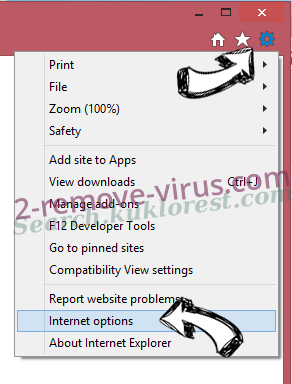
- In General Tab remove malicious URL and enter preferable domain name. Press Apply to save changes.

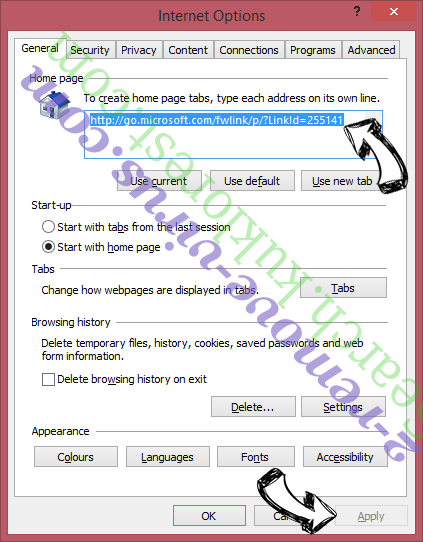
Reset your browser
- Click the Gear icon and move to Internet Options.

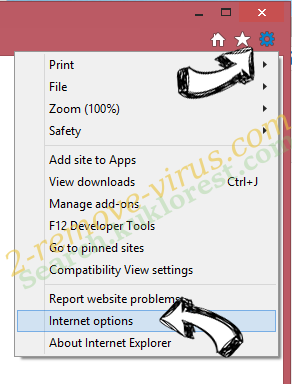
- Open the Advanced tab and press Reset.

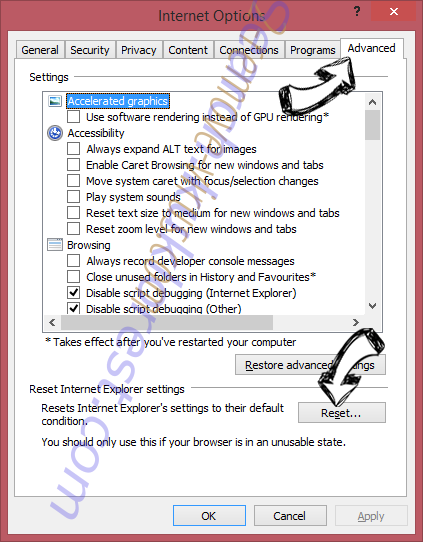
- Choose Delete personal settings and pick Reset one more time.

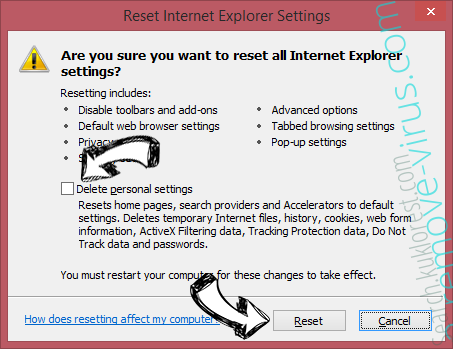
- Tap Close and leave your browser.

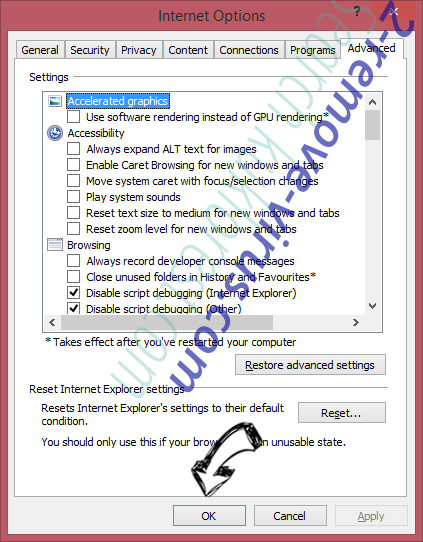
- If you were unable to reset your browsers, employ a reputable anti-malware and scan your entire computer with it.
Erase Email Scam from Google Chrome
- Access menu (top right corner of the window) and pick Settings.


- Choose Extensions.

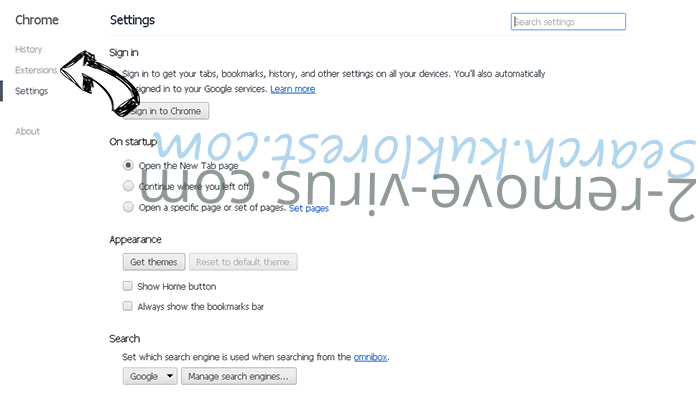
- Eliminate the suspicious extensions from the list by clicking the Trash bin next to them.

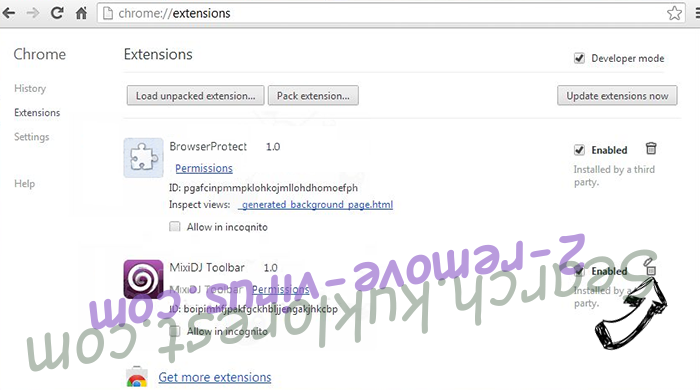
- If you are unsure which extensions to remove, you can disable them temporarily.

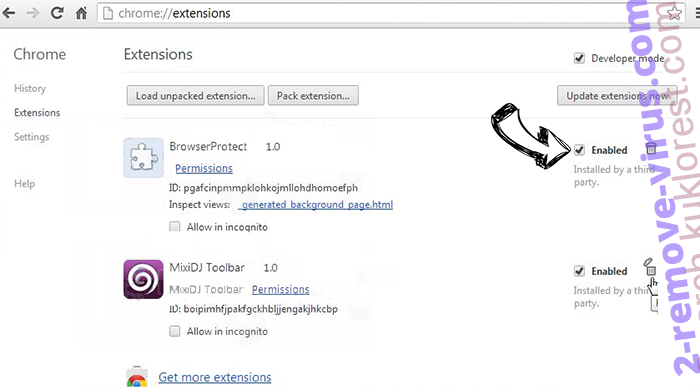
Reset Google Chrome homepage and default search engine if it was hijacker by virus
- Press on menu icon and click Settings.

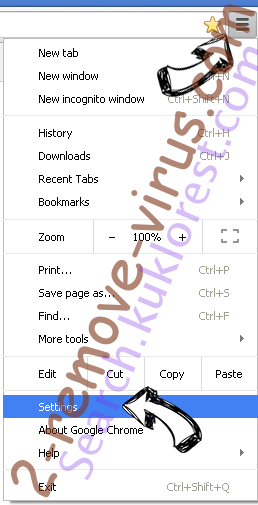
- Look for the “Open a specific page” or “Set Pages” under “On start up” option and click on Set pages.

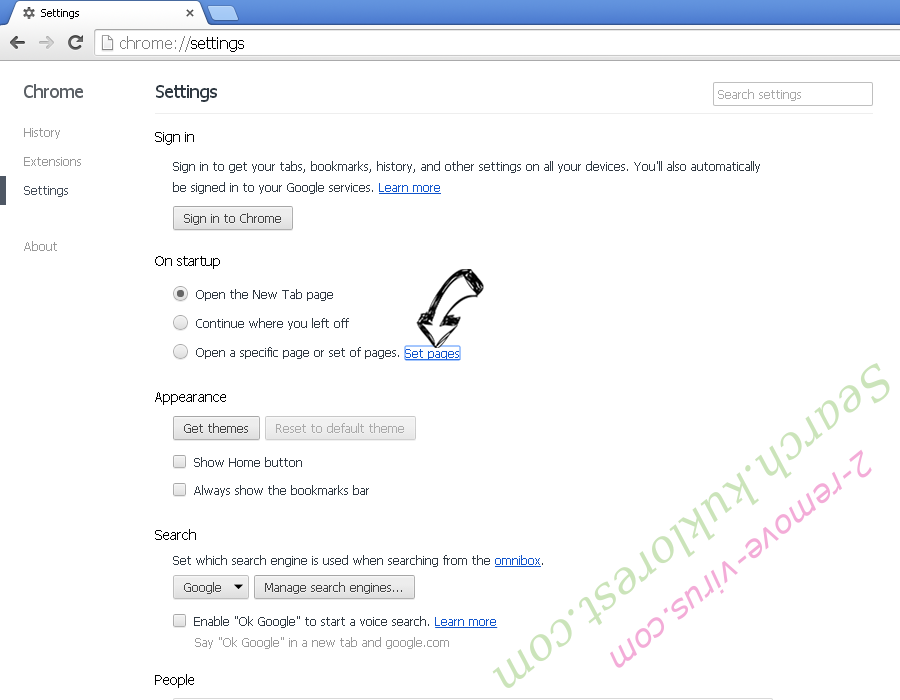
- In another window remove malicious search sites and enter the one that you want to use as your homepage.


- Under the Search section choose Manage Search engines. When in Search Engines..., remove malicious search websites. You should leave only Google or your preferred search name.

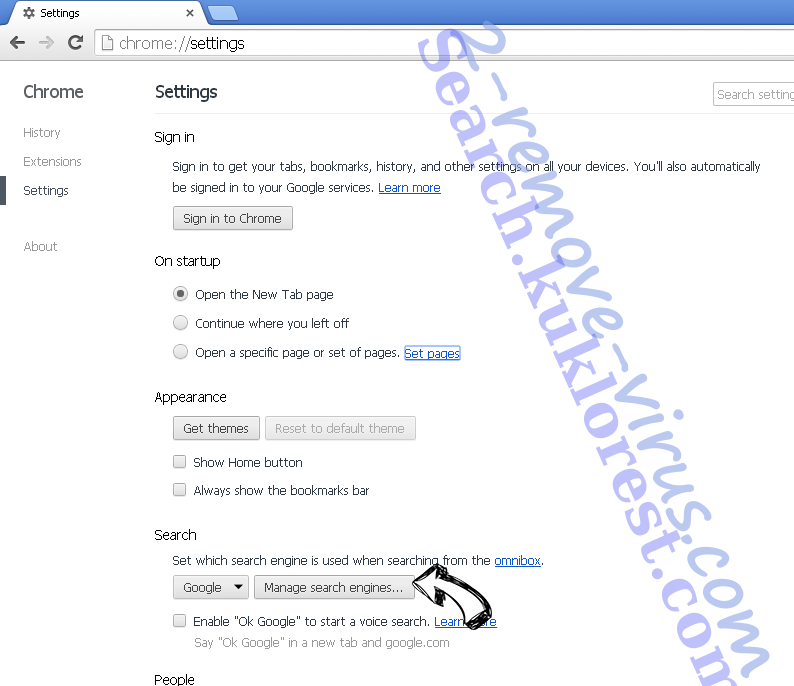

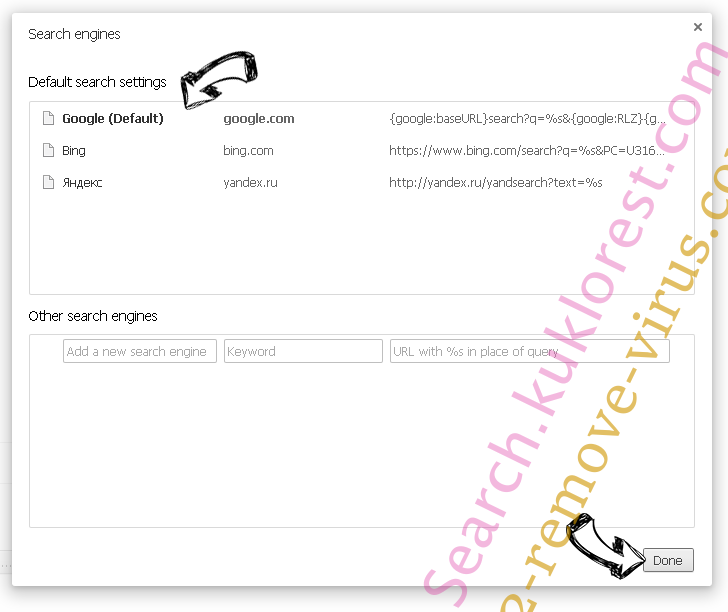
Reset your browser
- If the browser still does not work the way you prefer, you can reset its settings.
- Open menu and navigate to Settings.

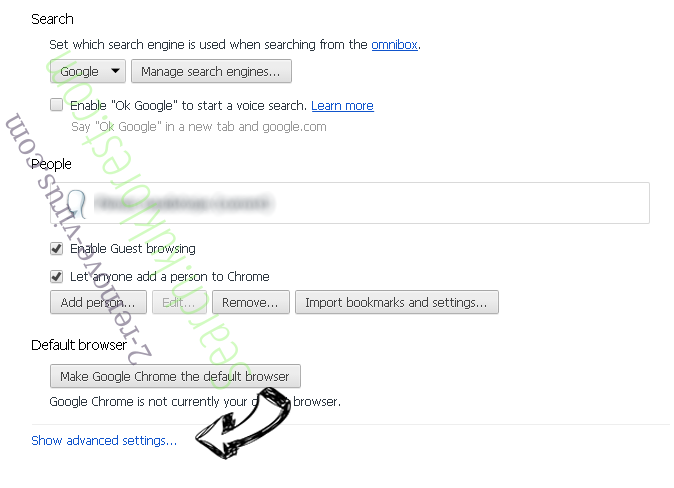
- Press Reset button at the end of the page.

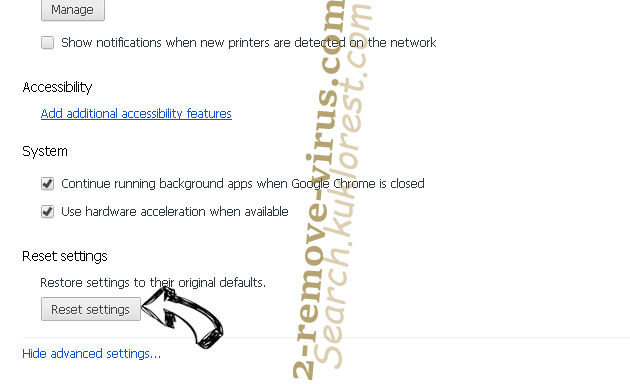
- Tap Reset button one more time in the confirmation box.

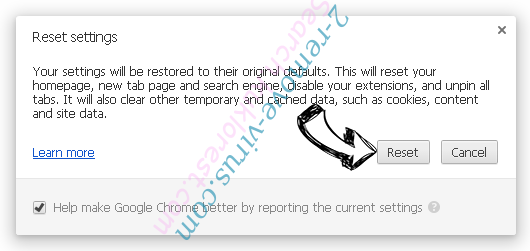
- If you cannot reset the settings, purchase a legitimate anti-malware and scan your PC.
Remove Email Scam from Mozilla Firefox
- In the top right corner of the screen, press menu and choose Add-ons (or tap Ctrl+Shift+A simultaneously).


- Move to Extensions and Add-ons list and uninstall all suspicious and unknown entries.

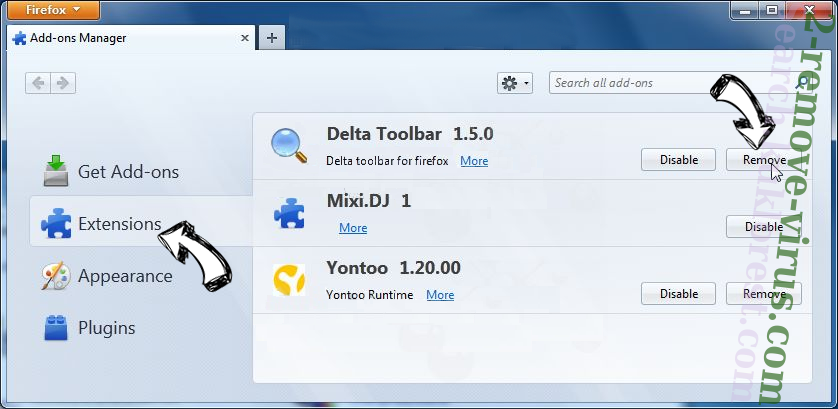
Change Mozilla Firefox homepage if it was changed by virus:
- Tap on the menu (top right corner), choose Options.

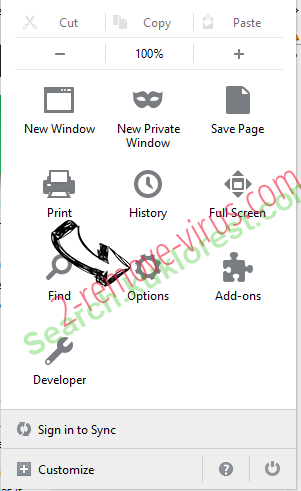
- On General tab delete malicious URL and enter preferable website or click Restore to default.

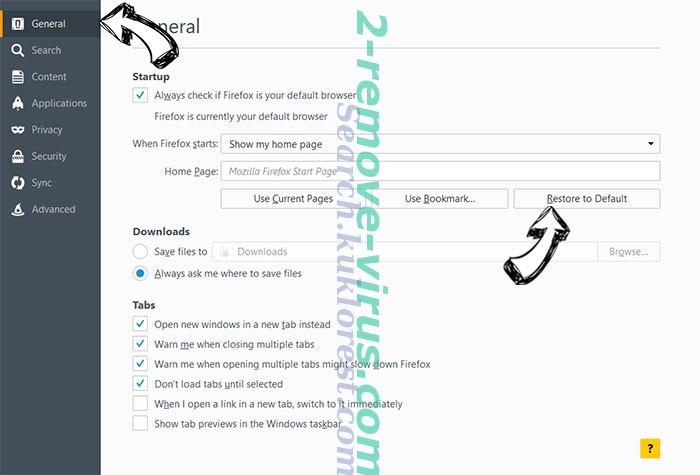
- Press OK to save these changes.
Reset your browser
- Open the menu and tap Help button.

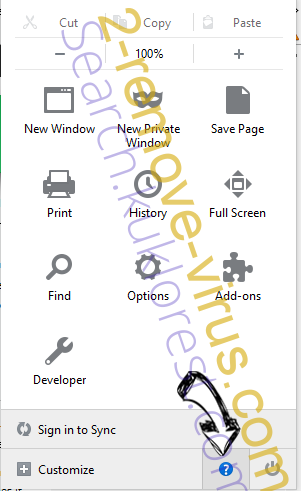
- Select Troubleshooting Information.


- Press Refresh Firefox.


- In the confirmation box, click Refresh Firefox once more.


- If you are unable to reset Mozilla Firefox, scan your entire computer with a trustworthy anti-malware.
Uninstall Email Scam from Safari (Mac OS X)
- Access the menu.
- Pick Preferences.

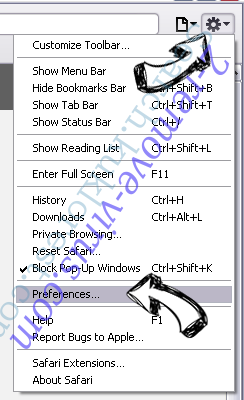
- Go to the Extensions Tab.

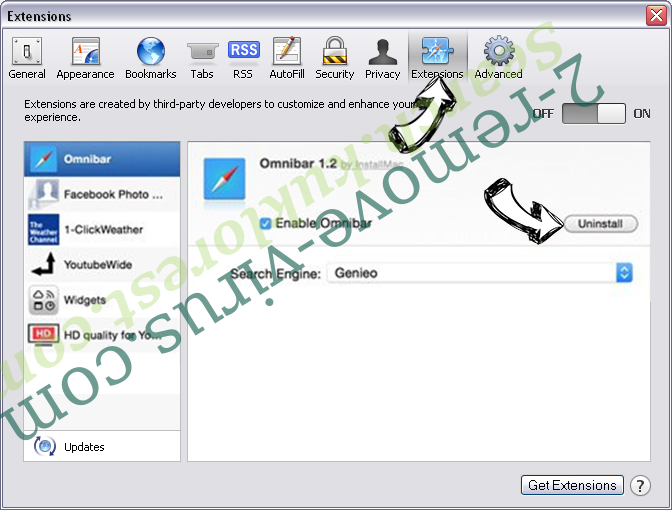
- Tap the Uninstall button next to the undesirable Email Scam and get rid of all the other unknown entries as well. If you are unsure whether the extension is reliable or not, simply uncheck the Enable box in order to disable it temporarily.
- Restart Safari.
Reset your browser
- Tap the menu icon and choose Reset Safari.


- Pick the options which you want to reset (often all of them are preselected) and press Reset.

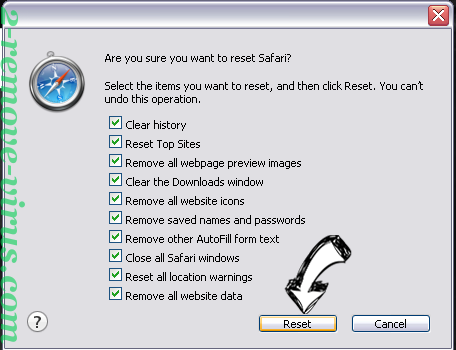
- If you cannot reset the browser, scan your whole PC with an authentic malware removal software.
Site Disclaimer
2-remove-virus.com is not sponsored, owned, affiliated, or linked to malware developers or distributors that are referenced in this article. The article does not promote or endorse any type of malware. We aim at providing useful information that will help computer users to detect and eliminate the unwanted malicious programs from their computers. This can be done manually by following the instructions presented in the article or automatically by implementing the suggested anti-malware tools.
The article is only meant to be used for educational purposes. If you follow the instructions given in the article, you agree to be contracted by the disclaimer. We do not guarantee that the artcile will present you with a solution that removes the malign threats completely. Malware changes constantly, which is why, in some cases, it may be difficult to clean the computer fully by using only the manual removal instructions.